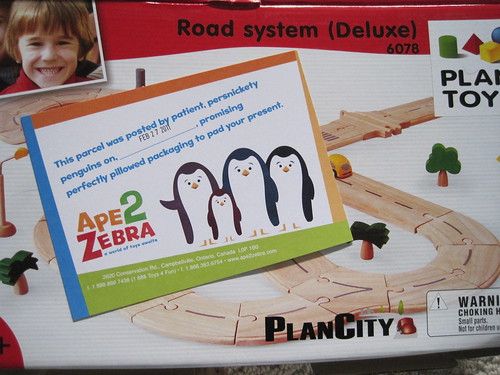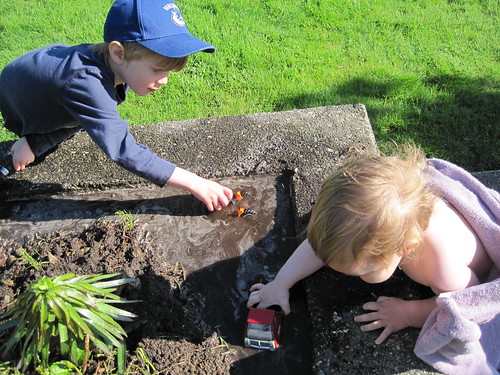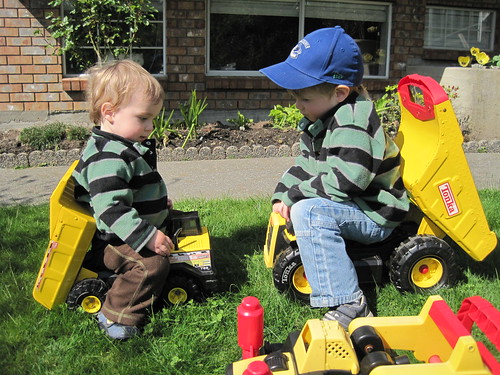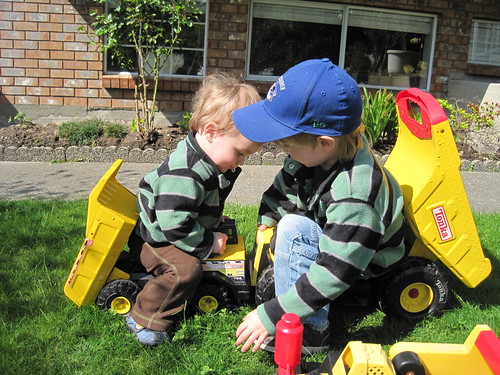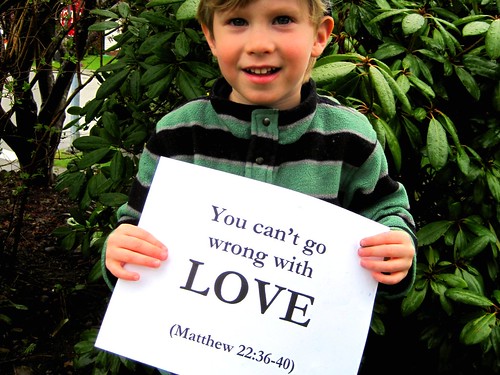Today in our Attachment Parenting Series, we will be discussing the role of fathers. If you have written a post on fatherhood as it relates to Attachment Parenting, please do share it with us in the comments below!
Introduction
Fathers play a vital role in Attachment Parenting (AP).*
When the mother is the primary caregiver, she will naturally be the one to spend the greatest amount of time in contact with the baby. In the early weeks, the mother will be the one to do most of the parenting of the infant simply by virtue of the amount of time a baby spends at the breast. However, it is
because of this higher contact between mother and child (when the mother is the primary caregiver) that the father should be highly involved in parenting during the time he does spend at home.
An involved father serves a two-fold purpose: he will bring his own unique offering to the child, and he will help prevent the mother from burning out.
*
For simplicity’s sake, I refer to the “husband”, “father”, and “marriage”. Please expand this to fit any form of long-term partnership that involves parenting a child, where one parent stays home with the child as the primary caregiver. The unique needs of attachment parenting as a single parent require their own focus, one which I am not qualified to provide.
Unique offering
The father brings his own unique offering to his child. With the exception of physically breastfeeding the baby, the father can be involved in all areas of raising his child. This close involvement will allow a young baby to become accustomed to the father’s distinct smell, sound, and feel, providing the baby with a second strong attachment relationship. As the child grows, he or she will continue to benefit from this close relationship and from the unique offerings brought by each parent.
Preventing burnout
The father’s involvement is of particular importance when taking an AP approach to parenting because it is far too easy for a mother to become burned out when left to meet all of the child's needs alone. Although it is common for the baby to naturally prefer the mother in the early months, the father plays a central role in creating a supportive environment, helping to nurture the child by supporting the mother. A father’s involvement includes both emotional support and practical involvement.
Emotional support
When a father is
supportive rather than critical, he frees the mother to share her burdens rather than bottling them up. Because AP mothers often find themselves swimming against the parenting current, they are frequently reluctant to discuss parenting struggles for fear of having the blame placed on their
choice to approach parenting in an AP manner. A mother who does not face the same criticism at home will be better able to confide in her husband and seek support from him when needed.
Emotional support can take many forms, including:
- public unity
- verbal encouragement
- involvement in decision-making
- assistance with meal prep and housework
- encouraging a tired mother to meet her own need for self-care, and
- working with the mother to make changes when necessary.
This emotional support should begin before the baby is born with the father’s
involvement in the pregnancy. In addition to the above, this involvement may include accompanying the mother to prenatal visits, talking to the baby in the womb, assisting in preparing the nursery, and encouraging the mother through
labour and delivery.
Practical involvement
Although a father cannot
breastfeed the child, he can
support the breastfeeding relationship not only emotionally, but in practical ways as well. Does the nursing mother need a glass of water or a book? Are there meals that need to be cooked or older children that need to be interacted with?
Babywearing is an especially useful tool for fathers,
encouraging a strong father-child bond as the baby becomes accustomed to the father’s unique walk, movement, heartbeat, smell, and voice. The father can
wear the baby around the house, take the baby for a walk, or rock the baby to sleep.
A father can be involved in
nighttime parenting as well. For the
bed-sharing family, this involvement may be more supportive than practical, as sleep disruptions are minimal when the stirring baby needs only to find comfort in a nearby parent or latch on to nurse back to sleep. When the child is sleeping in his or her own space, the father can bring the baby to the mother to nurse when needed, change the baby’s diaper if necessary, and settle the baby back to sleep.
Finally, a father can be involved in the
daily care of the baby and the home. This includes housekeeping, diaper changes, baths, meal prep and cleanup, bedtime routine, entertaining, comforting, and
responding to the baby’s cries.
Benefits
A father’s close involvement with his child will benefit each family member individually as well as the family as a whole.
Benefits to the father
In addition to the rewards any mutually loving relationship brings, the father will benefit from the strong attachment that develops through his close involvement with his child. As connection grows, the parent/child relationship becomes increasingly natural and instinctive. The resulting mutual trust and sensitivity is the basis of the parent/child relationship and the foundation upon which future discipline will rely.
Every interaction with the baby allows the father to better read and respond to his child’s cues. The better the father knows his child and the more the child trusts the father, the easier discipline will be as the child grows. The father will also be better equipped to care for the child in the absence of the mother.
Benefits to the mother
With the assistance of an involved, nurturing father, the mother will:
- be more rested and calm
- be better able to meet her own needs
- be less likely to develop postpartum depression
- feel confident in her husband’s abilities to care for his child, and
- benefit emotionally from the support and encouragement of her husband.
Benefits to the child
The child will benefit from having a second strong attachment relationship. Each parent offers something unique to their relationship with the child, and the child benefits from both. Having a close relationship with both parents better enables the child to grow to be a healthy, well-adjusted adult. The positive interaction with and example set by an involved father will be beneficial to the child as he or she grows.
Mothers and fathers relate to their children differently, approach discipline differently, and interact with their children differently. When the underlying approach to parenting is one of unity, these differences will balance and complement each other. The child will thrive on the unique input each parent brings into their life.
Encouraging the reluctant father
Because of the frequent contact and close proximity between mother and child, the AP mother quickly becomes adept at reading the child's cues. This can shake the confidence of a father at first. He needs to be given the opportunity to bond and learn to read his child's cues as well. AP is particularly beneficial to the father in these circumstances because it allows him to develop the deepest connection with his child in the limited time he has.
To encourage the reluctant father:
- promote early bonding through holding and comforting
- provide opportunities for him to learn to read his child’s cues
- allow him to develop his own unique way of meeting the child’s needs
- offer suggestions if needed without hovering or nitpicking (“You could try…”)
- purchase a gender-neutral baby carrier (the Ergo is a popular “male-approved” choice)
- provide resources for the father to develop a deeper understanding of Attachment Parenting
Summary
The father has an important role to play in Attachment Parenting, bringing his own unique offering to the child while helping to prevent the mother from burning out.
A father’s involvement includes both emotional support and practical involvement. Emotional support may include understanding, encouragement, unity, involvement in decision-making, and assistance in making changes when necessary. Practical involvement may include supporting the breastfeeding relationship, babywearing, co-sleeping, taking part in nighttime parenting, and assisting in the daily care of the baby and the home.
Attachment Parenting will allow the father to bond with his child more quickly and will give him useful tools to support the mother emotionally while assisting in the practical aspects of parenting. In addition to the benefits this offers to the mother and child, it enables the father to grow into a confident and involved parent.
Recommended Reading:
Fathers by Dr. Sears
Becoming a Father: How to Nurture and Enjoy Your Family by Dr. William Sears
Father's First Steps: 25 Things Every New Dad Should Know by Dr. Robert Sears


